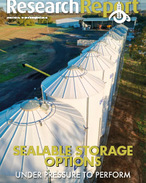Rabobank senior animal proteins analyst, Angus Gidley-Baird, said the Eastern Young Cattle Indicator (ECYI) dropped 37 per cent throughout the third quarter of the year, in response to the challenging conditions. However he added "Despite the same conditions prevailing in October, prices found a floor and levelled out."
"We believe that the producer uncertainty that was causing prices to drop has eased and, as we head toward summer, producers will be more certain about what stock numbers they will run, returning some stability to the market," Gidley-Baird said.
He said processing numbers are also expected to see some change in the coming months.
"Abattoirs are believed to have been running strongly for the last seven months, to the extent possible given labour constraints," Gidley-Baird said.
"With the holiday season approaching and some cattle still backed up in the system, it is uncertain if plants will shut down at year end, as is normal, before adding additional shifts in the new year, or if they use this period to get through some of the cattle that have built up in the system."
Either way, the bank is expecting slaughter numbers to increase in the first quarter of 2024.
DECLINING GLOBAL PRODUCTION
In its fourth quarterly global beef report, released yesterday, Rabobank said southern hemisphere beef-producing nations, including Australia, are continuing to increase production volumes, despite a global trend of production decline.
However, it notes increases seen in Australian and Brazilian beef production have not been enough to offset the production declines in Europe and the United States.
Rabobank reported global beef production across "monitored markets" is expected to decline one per cent year-on-year in 2023 and predicts 2024 will play out in a similar fashion.
According to the report the beef sector is seeing ongoing strong consumer demand in the US, although notes this may be weakening, which is accompanied by reduced cattle and beef supplies.
However, the bank said weak demand and high inventory levels in Asia are testing the market and while North American cattle prices continue to track at high levels, southern hemisphere prices remain soft.
Australian cattle prices have dropped dramatically, down 28 per cent since June, according to Rabobank, while New Zealand and Brazil have seen smaller drops.
Meanwhile prices in US were steady and Canadian prices rose three per cent between June in October.
CAUTIOUS CONSUMER SPENDING
Rabobank expects the ongoing slow global economic recovery will limit consumers' expenditure and likely curb their spending on beef next year.
The report said many markets, particularly in Asian countries, did not experience the growth in consumption expected in 2023, as economies recovered from Covid-19.
Rabobank said it is clear consumers are being much more cautious in their purchase decisions, which it anticipates will continue into next year.
It said indications from China are that more attention is being paid to value-for-money products, and less to premium ones, which is being driven by consumer caution.
"This consumer caution may be supported initially by reduced volumes of more expensive North American beef and increased volumes of Australian and South American beef," the bank said.
"However, when production in the US contracts to the point where it exerts upward price pressure on global beef prices, we may see some pushback from global beef consumers.
"It is possible that 2024 will see margins in beef supply chains being squeezed to manage higher prices and accommodate the consumer."
MIDDLE EAST CONFLICT
Given the import volumes of Israel and the Palestinian territories make up only one per cent of global beef imports, Rabobank said conflicts in the Middle East are not expected to significantly impact beef trade.
"If the conflict extends across the broader Middle East and North Africa region, the impact on global beef trade remains relatively small," the report said.
The bank estimates the wider Middle East area accounts for eight per cent of global beef imports, with Egypt being the largest importer, sourcing largely from Brazil (via the Mediterranean Sea).
"However, there may be indirect impacts if fuel and energy costs rise," the report said.
"Furthermore, the Middle East is an important import market for poultry and sheepmeat and any disruption to this trade may cause a rebalancing of protein trade around the world."



